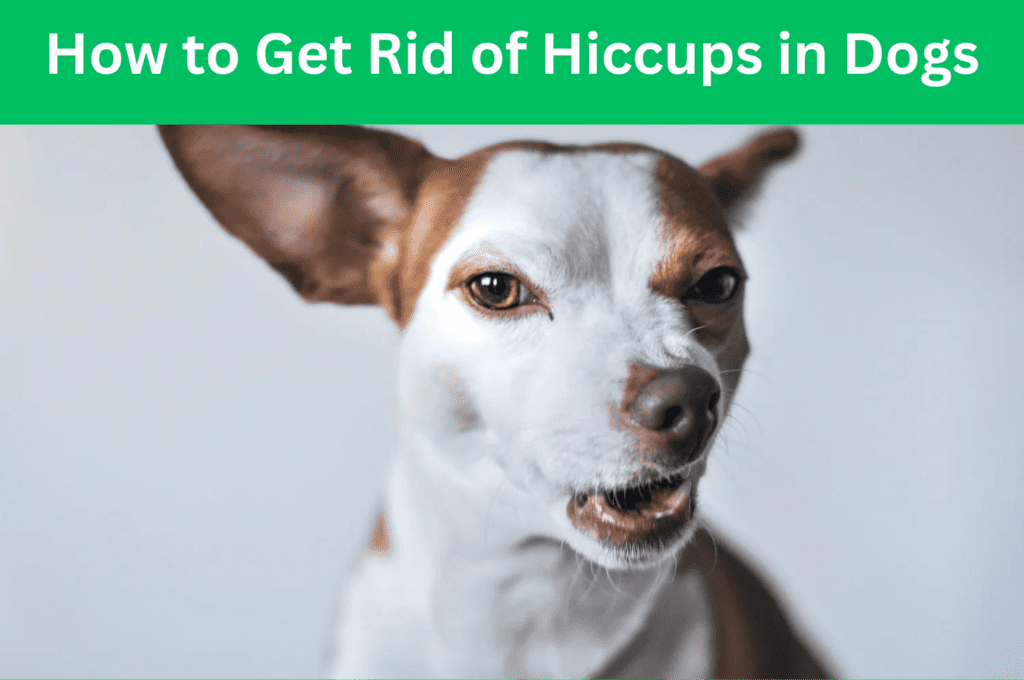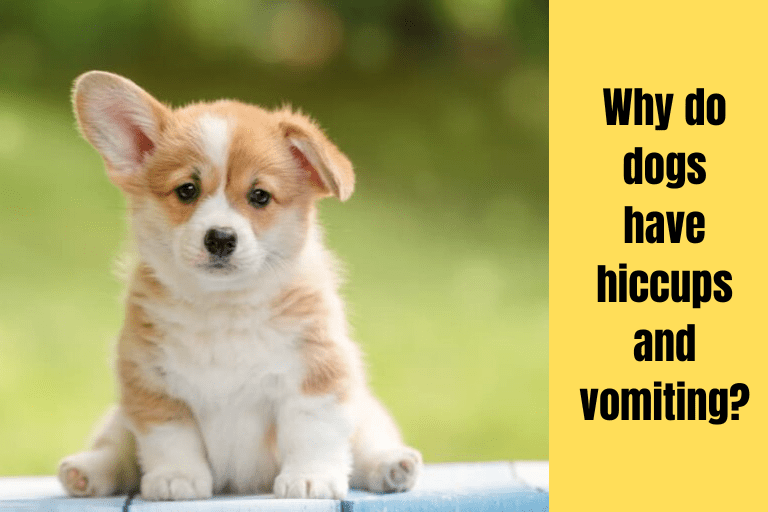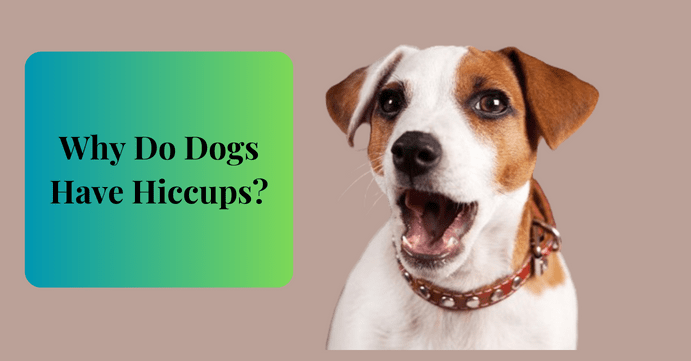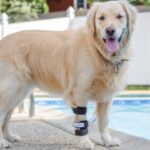If you have ever seen your dog hiccuping, you might have wondered what causes this cute but curious phenomenon. Hiccups are a natural reflex in most mammals, including humans and dogs.
Why do dogs have hiccups? They occur when there is an involuntary spasm in the diaphragm, the muscle that separates the chest from the abdomen.
This spasm causes the glottis, the opening between the vocal cords, to close abruptly and cut off the air intake, resulting in a “hic” sound. But why do dogs get hiccups, and are they harmful or harmless?
Contents
- 1 Why do dogs have hiccups? and Common Causes of Hiccups in Dogs
- 2 When to Worry About Hiccups in Dogs
- 3 How to Get Rid of Hiccups in Dogs
- 4 How can I prevent my dog from getting hiccups?
- 5 Can worms cause hiccups in dogs?
- 6 How to Get Rid of Puppy Hiccups
- 7 Why do dogs have hiccups and vomiting?
- 8 Conclusion
- 9 FAQs: Why do dogs have hiccups?
Why do dogs have hiccups? and Common Causes of Hiccups in Dogs
Hiccups in dogs are usually not a cause for concern, as they are often triggered by harmless factors such as:
Eating or drinking too fast
When dogs gulp down their food or water, they may swallow a lot of air along with it. Hiccups may result from the diaphragm spasming due to irritation from this extra air. To prevent this, you can try feeding your dog smaller portions at a time or using a slow feeder bowl that makes them eat more slowly.
Excitement or stress
Dogs can also get hiccups when they are very excited or stressed, such as when they meet new people or animals, play with their favorite toys, or go for a car ride. This is because excitement or stress can affect their breathing pattern and cause irregular or rapid breaths, which can trigger hiccups. To calm your dog down, you can try giving them some gentle strokes, soothing words, or a relaxing activity like chewing a bone or a toy.
Being a puppy
Puppies are more prone to hiccups than adult dogs, as their diaphragm and respiratory systems are still developing and maturing. Puppies also tend to be more energetic and playful, which can cause them to hiccup more often. As your puppy grows older, they will likely outgrow their hiccups, or at least have them less frequently.
When to Worry About Hiccups in Dogs
While most cases of hiccups in dogs are harmless and temporary, there are some rare situations where hiccups can be a sign of a more serious problem. You should consult your veterinarian if your dog has hiccups every day that:
– Last for more than a few hours or recur frequently
– Change to a wheezing or coughing sound
– Cause difficulty or discomfort in breathing
– often accompanied by other symptoms including fatigue, lack of appetite, vomiting, or diarrhea.
Some of the possible underlying causes of chronic or severe hiccups in dogs are:
Parasites. Some parasites, such as heartworms or roundworms, can infect your dog’s respiratory tract and cause irritation and inflammation, which can lead to hiccups. Parasites can also cause other serious health issues, such as anemia, weight loss, or organ damage. As advised by your veterinarian, you should frequently deworm your dog and give them a monthly prophylactic treatment to prevent and cure parasite infestations.
Respiratory diseases. Some respiratory diseases, such as asthma, bronchitis, pneumonia, or kennel cough, can affect your dog’s breathing and cause hiccups. Respiratory diseases can also cause other symptoms such as sneezing, nasal discharge, fever, or fatigue. To diagnose and treat respiratory diseases, you should take your dog to the vet for a physical examination, chest x-rays, blood tests, or other tests as needed.
Gastrointestinal disorders. Some gastrointestinal disorders, such as acid reflux, gastritis, or ulcers, can cause your dog’s stomach acid to flow back into the esophagus, which can irritate the diaphragm and cause hiccups. Gastrointestinal disorders can also cause other symptoms such as vomiting, diarrhea, abdominal pain, or blood in the stool. To diagnose and treat gastrointestinal disorders, you should take your dog to the vet for a physical examination, endoscopy, biopsy, or other tests as needed.
How to Get Rid of Hiccups in Dogs
If your dog has hiccups that are mild and infrequent, you don’t need to do anything, as they will likely go away on their own. However, if your dog has hiccups that are bothersome or persistent, you can try some of these home remedies to help them stop:
Give them some water
Drinking water can help your dog clear their throat and ease their hiccups. Just make sure they drink slowly and calmly, as gulping water can make hiccups worse.
Rub their belly
Rubbing your dog’s belly can help them relax and calm their breathing, which can reduce their hiccups. You can also massage their chest or back gently to soothe their diaphragm.
Distract them
Sometimes, the best way to get rid of hiccups is to make your dog forget about them. You can try playing with them, giving them a treat, or engaging them in a different activity that will take their mind off their hiccups.

How can I prevent my dog from getting hiccups?
Hiccups are caused by a spasm of the diaphragm, the muscle that helps your dog breathe. They are usually harmless and go away on their own, but they can be annoying and uncomfortable for your dog. To prevent your dog from getting hiccups, you can try the following tips:
- Feed your dog smaller meals. Eating too fast or too much can make your dog swallow air, which can irritate the diaphragm and cause hiccups. You can use a slow feeder bowl, a puzzle toy, or a large rock in the middle of the dish to make your dog eat more slowly and chew more thoroughly.
- Keep your dog calm and relaxed. Stress, excitement, and vigorous play can also affect your dog’s breathing pattern and trigger hiccups. You can help your dog calm down by giving them some gentle strokes, soothing words, or a relaxing activity like chewing a bone or a toy.
- Avoid spicy or cold foods and drinks. Spicy or cold foods and drinks can irritate the throat and stomach of your dog, which can also cause hiccups. You can offer your dog plain water or lukewarm broth instead of ice water or milk. You can also avoid giving your dog human foods that are spicy, salty, or fatty.
Helpful for Dog Health: Should You Bathe Your Dog Before Applying Flea Medication?
My Dog Needs Stitches But I Can’t Afford It
My Dog Jumped After Being Spayed
Can worms cause hiccups in dogs?
Worms are internal parasites that can infect your dog’s digestive and respiratory systems. Some worms, such as heartworms or roundworms, can cause hiccups in dogs by irritating the diaphragm or the lungs.
Hiccups can be a sign of a serious worm infestation, especially if your dog also has other symptoms such as coughing, wheezing, sneezing, vomiting, diarrhea, weight loss, or lethargy.
To prevent and treat worm infections, you should regularly deworm your dog and use a monthly preventive medication as recommended by your veterinarian. You should also keep your dog away from contaminated soil, water, or feces, and dispose of your dog’s waste properly.
How to Get Rid of Puppy Hiccups
Puppy hiccups are very common and usually not a cause for concern. They are often caused by eating or drinking too fast, excitement, stress, or normal brain development. Most puppy hiccups will go away on their own within a few minutes, but if you want to help your puppy get rid of hiccups, you can try the following methods:
- Give your puppy some water. Drinking water can help your puppy clear their throat and ease their hiccups. Just make sure they drink slowly and calmly, as gulping water can make hiccups worse.
- Rub your puppy’s belly. Rubbing your puppy’s belly can help them relax and calm their breathing, which can reduce their hiccups. You can also massage their chest or back gently to soothe their diaphragm.
- Distract your puppy. Sometimes, the best way to get rid of hiccups is to make your puppy forget about them. You can try playing with them, giving them a treat, or engaging them in a different activity that will take their mind off their hiccups.
Why do dogs have hiccups and vomiting?
Hiccups and vomiting are two different symptoms that can have different causes, but sometimes they can occur together in dogs. This can be a sign of a more serious problem, such as a respiratory disease, a gastrointestinal disorder, or a parasite infection. Some of the possible causes of hiccups and vomiting in dogs are:
- Respiratory diseases. Some respiratory diseases, such as asthma, bronchitis, pneumonia, or kennel cough, can affect your dog’s breathing and cause hiccups. Respiratory diseases can also cause other symptoms such as sneezing, nasal discharge, fever, or fatigue. To diagnose and treat respiratory diseases, you should take your dog to the vet for a physical examination, chest x-rays, blood tests, or other tests as needed.

- Gastrointestinal disorders. Some gastrointestinal disorders, such as acid reflux, gastritis, or ulcers, can cause your dog’s stomach acid to flow back into the esophagus, which can irritate the diaphragm and cause hiccups. Gastrointestinal disorders can also cause other symptoms such as vomiting, diarrhea, abdominal pain, or blood in the stool. To diagnose and treat gastrointestinal disorders, you should take your dog to the vet for a physical examination, endoscopy, biopsy, or other tests as needed.
- Parasites. Some parasites, such as heartworms or roundworms, can infect your dog’s respiratory tract and cause irritation and inflammation, which can lead to hiccups. Parasites can also cause other serious health issues, such as anemia, weight loss, or organ damage. To prevent and treat parasite infections, you should regularly deworm your dog and use a monthly preventive medication as recommended by your veterinarian.
Conclusion
Hiccups are a common and usually harmless occurrence in dogs, as they are caused by a spasm in the diaphragm that interrupts the air intake. Why do dogs have hiccups? Hiccups in dogs can be triggered by various factors, such as eating or drinking too fast, excitement or stress, or being a puppy.
Most cases of hiccups in dogs will go away on their own, but you can also try some home remedies to help them stop, such as giving them water, rubbing their belly, or distracting them. However, if your dog has hiccups that are chronic, severe, or accompanied by other symptoms, you should take them to the vet, as they may indicate a more serious health problem, such as parasites, respiratory diseases, or gastrointestinal disorders.
FAQs: Why do dogs have hiccups?
Q: What causes hiccups in dogs?
- A: Hiccups in dogs are caused by a spasm in the diaphragm, the muscle that separates the chest from the abdomen. This spasm causes the glottis, the opening between the vocal cords, to close abruptly and cut off the air intake, resulting in a “hic” sound. Hiccups in dogs can be triggered by various factors, such as eating or drinking too fast, excitement, stress, or being a puppy.
Q: How can I get rid of my dog’s hiccups?
- A: Most cases of hiccups in dogs are harmless and temporary, and will go away on their own. However, if you want to help your dog stop hiccuping, you can try some of these home remedies:
- Give them some water. Drinking water can help your dog clear their throat and ease their hiccups. Just make sure they drink slowly and calmly, as gulping water can make hiccups worse.
- Rub their belly. Rubbing your dog’s belly can help them relax and calm their breathing, which can reduce their hiccups. You can also massage their chest or back gently to soothe their diaphragm.
- Distract them. Sometimes, the best way to get rid of hiccups is to make your dog forget about them. You can try playing with them, giving them a treat, or engaging them in a different activity that will take their mind off their hiccups.
Q: When should I worry about my dog’s hiccups?
- A: While most cases of hiccups in dogs are not a cause for concern, there are some rare situations where hiccups can be a sign of a more serious problem. You should consult your veterinarian if your dog has hiccups that:
- Last for more than a few hours or recur frequently
- Change to a wheezing or coughing sound
- Cause difficulty or discomfort in breathing
- Are accompanied by other symptoms such as vomiting, diarrhea, loss of appetite, or lethargy
Some of the possible underlying causes of chronic or severe hiccups in dogs are: – Parasites. Some parasites, such as heartworms or roundworms, can infect your dog’s respiratory tract and cause irritation and inflammation, which can lead to hiccups. Parasites can also cause other serious health issues, such as anemia, weight loss, or organ damage. To prevent and treat parasite infections, you should regularly deworm your dog and use a monthly preventive medication as recommended by your veterinarian. – Respiratory diseases.
Some respiratory diseases, such as asthma, bronchitis, pneumonia, or kennel cough, can affect your dog’s breathing and cause hiccups. Respiratory diseases can also cause other symptoms such as sneezing, nasal discharge, fever, or fatigue. To diagnose and treat respiratory diseases, you should take your dog to the vet for a physical examination, chest x-rays, blood tests, or other tests as needed. – Gastrointestinal disorders.
Some gastrointestinal disorders, such as acid reflux, gastritis, or ulcers, can cause your dog’s stomach acid to flow back into the esophagus, which can irritate the diaphragm and cause hiccups. Gastrointestinal disorders can also cause other symptoms such as vomiting, diarrhea, abdominal pain, or blood in the stool. To diagnose and treat gastrointestinal disorders, you should take your dog to the vet for a physical examination, endoscopy, biopsy, or other tests as needed.




